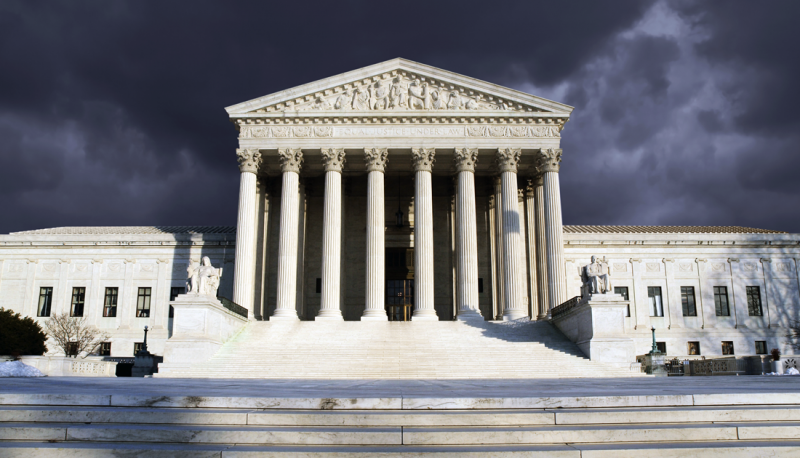The Supreme Court issued a decision in Fulton v. Philadelphia, ruling for Catholic Social Services in a highly anticipated foster adoption discrimination case. However, the narrow nature of the ruling means that, at least for now, federal, state, and local governments remain free to pass and enforce neutral laws prohibiting anti-LGBTQ+ discrimination.
CSS had a contract with the city to recommend foster families, but the group refused to engage with same-sex couples in violation of the contract and city rules. So the city stopped contracting with CSS, which then claimed that the city had violated its rights under the First Amendment’s Free Exercise Clause. All nine justices agreed, but Justices Thomas, Alito, and Gorsuch argued for a far more sweeping attack on nondiscrimination laws.
Chief Justice Roberts’s narrow majority opinion was joined by the more progressive justices (Breyer, Sotomayor, and Kagan), as well as by conservatives Kavanaugh and Barrett. Although it was a loss for those opposing anti-LGBTQ+ discrimination and for those favoring religious free exercise as it has traditionally been understood, it may have been as narrow a loss as possible given the current membership of the Court, leaving most anti-discrimination protections unscathed.
The majority avoided the devastating attack on LGBTQ+ equality that many had feared. Instead, as in Masterpiece Cakeshop, they took a narrow approach specific to the facts of this case and did not undermine the government’s general ability to prohibit anti-LGBTQ+ discrimination.
Under the Court’s Employment Division v. Smith precedent, religiously neutral generally applicable laws that incidentally burden religious exercise are not subject to strict scrutiny and are generally upheld. In contrast, a non-neutral law that effectively targets religious exercise is subject to strict scrutiny—it must advance a compelling interest and be narrowly tailored to achieve those interests—and is more likely to be struck down.
Had the Supreme Court decided to characterize all prohibitions against anti-LGBTQ+ discrimination as targeting religious exercise, it would have triggered strict scrutiny of such laws across the country, putting them at risk of being overturned. The impact could have been devastating.
Instead, while the majority did use strict scrutiny, the trigger for that was something specific to the contracts at issue in this case. The standard foster care contract used by Philadelphia prohibits organizations from discriminating against same-sex couples, but it grants the public service commissioner “sole discretion” to make exemptions. For the majority, that contractual provision automatically means that this is not a case about a generally applicable law, so Smith’s relaxed standards do not apply. So while the majority applied strict scrutiny and ruled in favor of CSS, the analysis does not have a larger impact on anti-discrimination laws.
Justice Alito wrote a concurrence that ran 77 pages, joined by Thomas and Gorsuch. He railed against the majority for not addressing and overruling the Smith precedent and restoring heightened scrutiny to all laws that burden religious exercise. While that was his main focus, he also made clear that he would rule for CSS in this case under any form of scrutiny. Specifically, he wrote that “Philadelphia’s ouster of CSS from foster care work simply does not further any interest that can properly be protected in this case,” at least in part because there are other organizations in Philadelphia that don’t discriminate.
This case had the potential of being another step in the far right’s effort to transform religious liberty provisions from a shield protecting the free exercise of religion into a sword to deprive other people of their legal rights. The Supreme Court’s far-right majority signed on to this project with 2014’s notorious Hobby Lobby opinion, which Justice Alito authored. He also wrote the majority opinion in 2020’s Our Lady of Guadalupe School v. Morrissey-Berru, which made it easier for religiously affiliated schools to discriminate in hiring by claiming that the employees are really ministers, making their hiring (or firing) a choice protected by the First Amendment. And since Justice Barrett joined the Court, it has favored churches through orders empowering them to exempt themselves from health and safety protections imposed during the COVID-19 pandemic.
But Fulton does not do the damage that those cases did. It does not announce a new constitutional right to use religion as an excuse to discriminate. It does not undermine existing or proposed laws prohibiting LGBTQ+ discrimination. While that is good, the religious right’s campaign to redefine religious liberty remains a threat, making it critically important that President Biden nominate and the Senate confirm Supreme Court justices who recognize that the law and the Constitution protect all of us.

